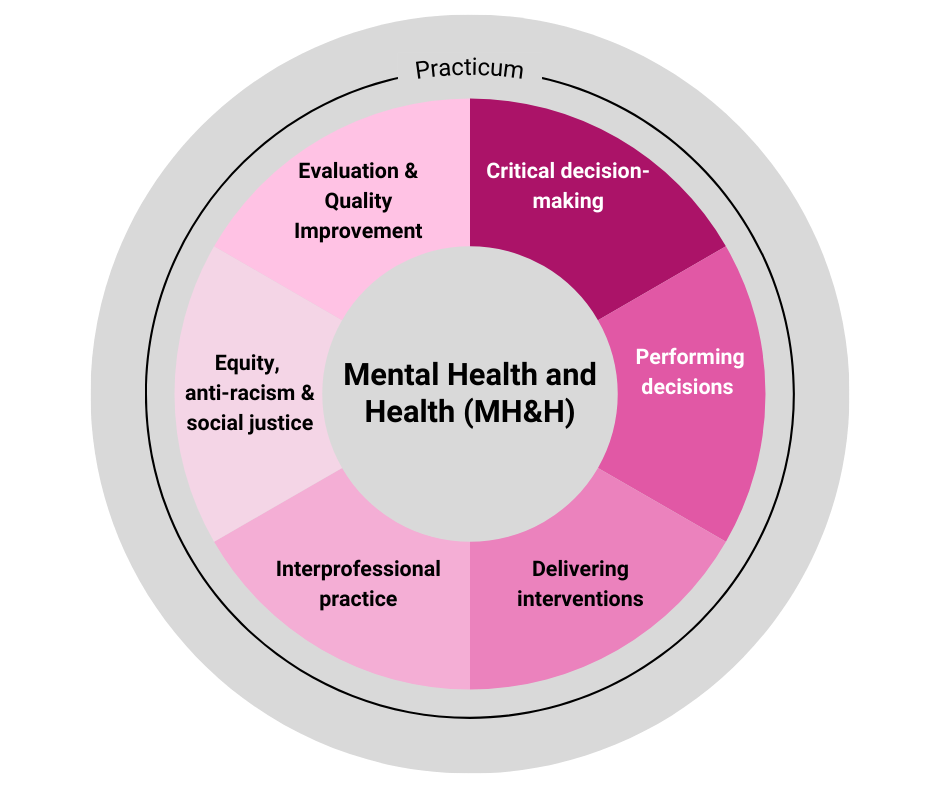Mental health and health competencies
Students in the Mental health and health Field of Study are expected to acquire competencies in he following areas: evaluation & quality improvement, critical decision making, performing decisions, delivering interventions, interprofessional practice, and equity, anti-racism and social justice. Learn about the skills, courses, and assessment indicators and methods associated with each below.

Evaluation & quality improvement
| Skills |
- Utilizing research
- Identifying success indicators
- Implementing measures
- Monitoring progress
|
| Courses |
- SWK4604
- SWK4631
- SWK4511
- SWK4632
|
| Assessment indicators/methods |
- Ability to evaluate through use of appropriate tools and observation of changes (SBL & paper)
- Articulate gaps in
MH&H research
- Consume, contribute and use research (grant proposal paper)
- Monitoring and improving quality assurance in MH&H
|
Critical decision-making
| Skills |
- Integrating ethics
- Compiling evidence
- Assessing content/complexity
|
| Courses |
- SWK4412
- SWK4622
- SWK4604
- SWK4631
- SWK4511
|
| Assessment indicators/methods |
- Analyze complex issues of clients-in-contexts and policy Link-Think in SBL)
- Apply ethical decision-making tool (assignment)
- Provide the rational for their formulation & intervention selection (paper)
- Critically analyze, synthesize and use research evidence (paper)
|
Performing decisions
| Skills |
- Articulating decision processes
- Communicating decisions
- Demonstrating decisions
|
| Courses |
- SWK4632
- SWK4622
- SWK4604
- SWK4631
- SWK4511
|
| Assessment indicators/methods |
- Presenting client needs & research-based rationale for intervention selection/research proposal (SBL presentation)
- Assessment of performance (SBL) – communicating, making contracts and goal setting
|
Delivering interventions
| Skills |
- Enhancing coping & resilience
- Reducing distress
- Relational Connection
- Navigation systems
|
| Courses |
- SWK4604
- SWK4622
- SWK4632
- SWK4631
|
| Assessment indicators/methods |
- Assess common factor approach (alliance, collaboration) during intervention (SBL)
- Conduct MSE, SRA, and SAA (SBL)
- Utilize population appropriate intervention skills (SBL)
- Apply motivational interviewing, trauma-informed treatment skills (role-play)
- Utilized critical intervention skills (e.g. CBT, EFT, IPT)
- Critically integrate various skills (psychotherapy integration)
|
Interprofessional practice
| Skills |
- Building teams
- Communicating role
- Addressing conflict
- Advocating
|
| Courses |
- SWK4622
- SWK4632
- SWK4631
- SWK4412
|
| Assessment indicators/methods |
- Assess collaboration (paper)
- Explain social work approach with H&MH issue (paper)
- Articulate social work role in interprofessional team (role play)
- Assess facilitation skills for interprofessional meeting (role play)
- Develop team-patient-caregiver goals of care (paper)
|
Equity, anti-racism & social justice
| Skills |
- Prioritizing equity and inclusion
- Validating cultural expertise
- Identifying MH&H beliefs
- Addressing SDoH
|
| Courses |
- SWK4604
- SWK4631
- SWK4622
- SWK4632
- SWK4412
- SWK4511
|
| Assessment indicators/methods |
- Culturally sensitive skills (transcript analysis; SBL)
- Uncovering health beliefs (SBL with family)
- Culturally informed assessments and treatment (paper/SBL)
- Articulate social determinants of health (SDoH; case formulation & Tx paper/SBL/Policy brief paper)
|
